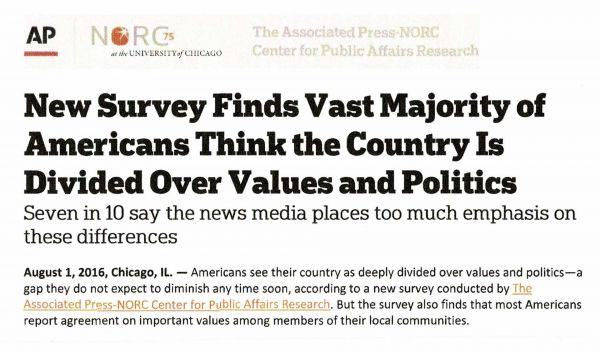A Glance Back at 2016
The U.S. Presidential Election of 2016 will not simply go down in history as its most contentious election; it may actually go down as the straw that broke the American camel's back. After the Election, articles appeared in major magazines and newspapers for the first time to introduce the idea of dividing the US.
It is easy to see why. In the summer run-up to the Election, the antipathy of the voting public toward the candidates and the hostility of the candidates toward each other exceeded anything in living memory. November 8th came and went, but the hostility continued, fueled by allegations of voter-fraud. After the Supreme Court refused to hear the petitions for a recount, Democrats routinely described Trump as "Not Our President!" Many of them threatened to leave the country, although few actually did.
I am seventy-years-old and have learned to take the antagonism with a grain of salt. Most of the people I know vote "Bourgeois" before they vote Republican or Democrat. They listen to cable-news a lot for its take on the issues, and for orientation. They express outrage over the actions of the other party more as a self-definition thing, rather than to resolve anything. It's the sick side of being Bourgeois, I guess, and involves a lot of role-playing.
Nevertheless, the Election of 2016 may have changed the rules of the game. The radical-Left group Antifa emerged after the Democrat defeat, ready to do anything. Marginal types took to the street, started fires, threatened people, disrupted public events, and clashed with street-fighters on the Right. Those right-wing street-fighters started their own campaign of violence with the defeat of Trump in 2020.
The National Opinion Research Center (NORC) picked up on the changes in the political environment in its polls during the Summer run-up to the Election of 2016 and published its findings in August of that year: "Americans see their country as deeply divided over values and politics--a gap they do not expect to diminish any time soon."
Furthermore, "Fifty-two percent say the country's best days are in the past." NORC says this represents the opinion of most of the Whites. "Forty-six percent say they (best days) are ahead of us." This position represents the opinion of the nation's Black and Hispanic minorities.
The poll also reports that most Americans form relationships with people who have the same opinions about things and embrace the same cultural standards. Most Americans appeared to understand the ramifications of the 2016 Election and believed that both Presidential candidates would cause a division in the nation--forty-three percent, if Hillary Clinton were elected, and seventy-three percent believing that a Trump victory would. Since Trump won with close to fifty percent of the popular vote, many of those who voted for him also understood the impact his election would have.

